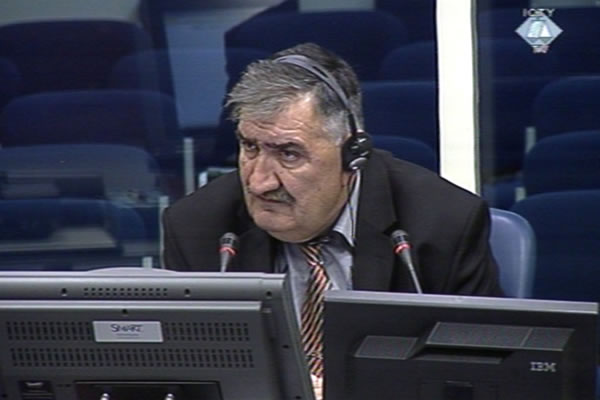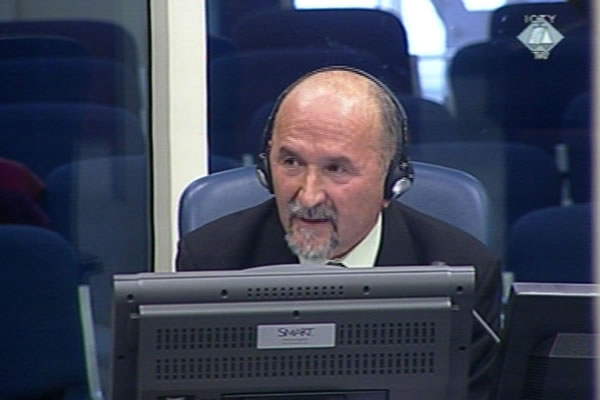Home
RELIGION DETERMINED MENU IN KULA PRISON RESTAURANT
Former warden of the Kula prison Soniboj Skiljevic contends that during the war the facility served food with no pork to Muslims. The food was prepared using cooking oil, the witness said. At the same time, Skiljevic claimed that prisoners got drunk when they were sent to do forced labor. Former RS prime minister Dusan Kozic denied that Karadzic’s civilian authorities had anything to do with Mladic’s army
 Soniboj Skiljevic, defence witness of Radovan Karadzic
Soniboj Skiljevic, defence witness of Radovan Karadzic Yesterday, the Republika Srpska president Milorad Dodik replaced Soniboj Skiljevic in the witness stand. Today, the wartime warden of the Kula prison in Sarajevo was back in court to continue his evidence in Radovan Karadzic’s defense. In the cross-examination, Skiljevic fought hard to defend his claim that the conditions in the prison were close to perfect.
Prosecutor Gustafson showed Skiljevic a report which indicates that the elderly, women and teenage girls were among the detainees in Kula. This contradicts Skiljevic’s allegation that only offenders and prisoners of war were held there. Skiljevic first tried to shift the blame on the army that was bringing in the civilians who had been arrested. When the prosecutor put it to him that ‘every reasonable person’, particularly if they are the prison warden, should figure out that they were civilians who had been expelled, Skiljevic replied ‘this was my thinking too’. One day, Skiljevic added, he might ‘write a book’ about the events. In his statement to the investigators in 2003, Skiljevic explained that the Muslim civilians from Sokolac and Rogatica were brought to Kula in 1994. Today Skiljevic clarified that the prison administration had been ‘tricked’. The army dumped the women and children in front of the prison, Skiljevic recounted, and the prison authorities decided to put them up ‘out of pity and good will’.
The prosecutor went on to present a series of military documents which show that prisoners were taken to the frontlines to dig trenches. Even the prison logbook stated that some Muslims complained on 27 February 1993 that they were abused and beaten as they did forced labor. Skiljevic explained how it happened: prisoners were dispatched to help the army at a location near the cemetery, where there was always some brandy left by the mourners after funerals. The prisoners got drunk together with the soldiers and then quarreled. Skiljevic said they were ‘punished’ for the transgression. They were not sent to do forced labor again; another group of non-Serb prisoners replaced them.
In his statement to the defense team Skiljevic claimed that Muslim and Serb prisoners ate the same food as the prison staff. The prosecutor showed a report of a Justice Ministry inspection carried out in April 1994 that showed otherwise. The report stated that the Serb prisoners were given the same food as the staff while special meals were prepared ‘for other detainees’, Muslims and Croats. The witness said that it was a religious issue. Muslims had requested a pork-free diet; their food was prepared using cooking oil. To describe just how the prison restaurant was exquisite, the witness said that for Eid-al Fitr and Christmas the restaurant offered ‘better meals with a cake and a glass of wine’. The State Court in Sarajevo acquitted Skiljevic in the appellate proceedings of the crimes in Kula. The prosecutor nevertheless recalled that the judgment did determine that non-Serbs in Kula had been unlawfully detained, abused and made to do forced labor at the front lines.
Dusan Kozic, who was the Republika Srpska prime minister from August 1994 to October 1995, testified after Skiljevic completed his evidence. In his statement to the defense, Kozic claimed that the Bosnian Serb civilian and military authorities didn’t cooperate well. This was an effort on Kozic’s part to exonerate Karadzic from responsibility for the VRS crimes. Prosecutor McKenna showed reports from several meetings that indicate that the government purchased arms from Bulgaria. Also, according to the reports, Kozic attended a meeting with Zeljko Raznatovic Arkan and the two officers of the Serbian State Security Service, Franko Simatovic and Radojica Bozovic, in September 1995. At the meeting, Kozic agreed with the others that Arkan would be paid three million German marks for the capture of the Teocak hill. The witness confirmed that the arms were procured in Bulgaria but stressed that he didn’t know anything about the meeting. Kozic said that he knew Simatovic and Bozovic ‘only through the media’ and Arkan by sight.
According to the prosecution, the Srebrenica operation in July 1995 is evidence of the involvement of the civilian authorities, headed by Karadzic, in military operations. The prosecutor stated that the attack was launched in line with Karadzic’s Directive 7, issued in March 1995. The prosecutor then dealt with a series of Karadzic’s public appearances in which he confirmed that he ordered the attack on Srebrenica and that he felt ‘no remorse about it’. The prosecution is in possession of Karadzic’s orders to deploy the police in Srebrenica after the town was captured. Several documents indicate that the authorities in the neighboring municipalities were ordered by Kozic’s government to provide buses and trucks to transport Muslim civilians from Potocari. The ample evidence wasn’t enough for the witness to accept the prosecution’s arguments. The witness said that it was ‘a chaotic time’ when situations dictated decision-making. The only thing the witness was sure of was that the Muslim survivors left Srebrenica voluntarily. They were ‘tired and exhausted’ after three years of ‘war psychosis’ in Srebrenica, Kozic explained.
In the re-examination Kozic openly showed his fondness for the accused. He said ‘one of the most wonderful motives’ behind his decision to side with Karadzic before the war in BH was Karadzic’s ‘tolerance’ and the Serbian Democratic Party’s ‘nice and soft’ policies. Tolerance, in fact, was reflected in Karadzic’s calls for the reconciliation between Partisans and Chetniks, not to the relations between Serbs and their Muslim and Croat neighbors.
Photos
Linked Reports
- Case : Karadzic
- 2013-04-09 DODIK BLAMES IZETBEGOVIC, HIGH REPRESENTATIVE AND OTP
- 2013-04-08 AIRBRUSHING SARAJEVO REALITY
- 2013-04-05 ‘PSYCHOPATHS AND BULLIES’ COMMITTED CRIMES
- 2013-04-11 PRESIDENT OF ‘COMMITTEE FOR TRUTH’ ABOUT KARADZIC TESTIFIES IN HIS DEFENSE
- 2013-04-12 BEATINGS ‘WITHOUT RHYME OR REASON’
- 2013-04-15 GENERAL GALIC BEGINS TESTIMONY IN KARADZIC’S DEFENSE

